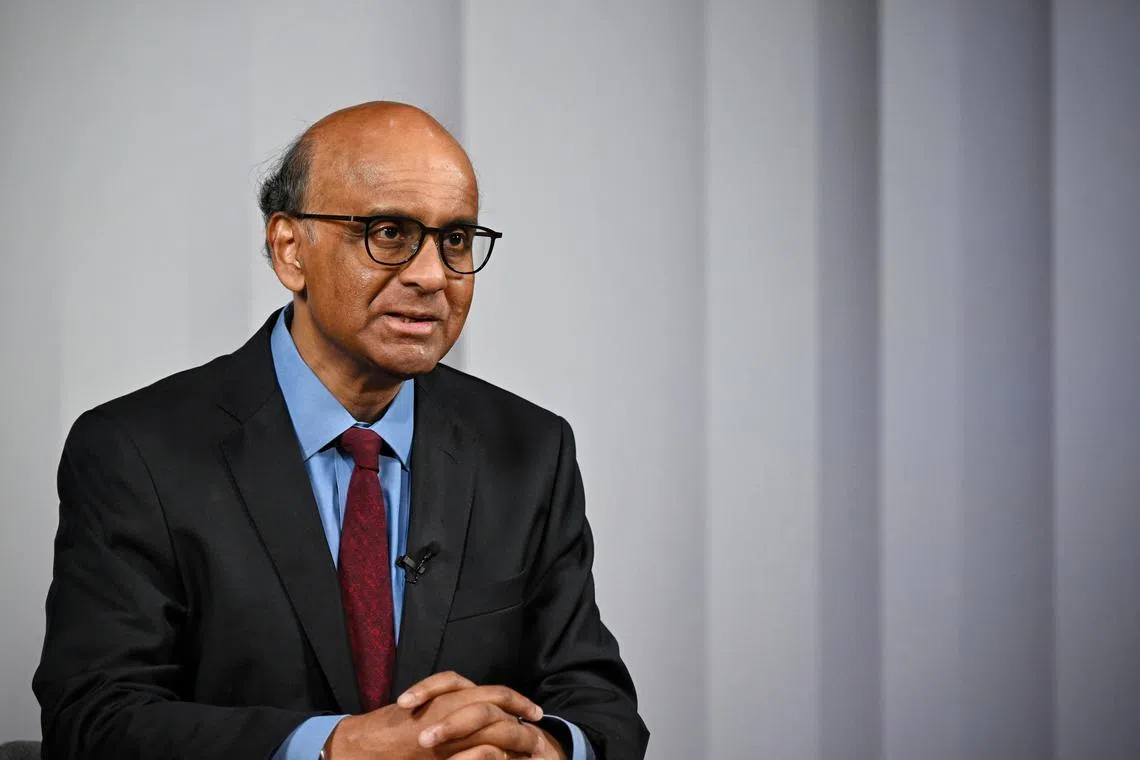Candidate broadcast
If I am a partisan, I am a partisan for better chances for S’poreans: Presidential candidate Tharman Shanmugaratnam
Sign up now: Get ST's newsletters delivered to your inbox

Mr Tharman Shanmugaratnam highlighted the international standing and experience he would bring to the office of the presidency.
ST PHOTO: KUA CHEE SIONG
Kok Yufeng, Correspondent
Follow topic:
SINGAPORE - Presidential candidate Tharman Shanmugaratnam said in a message to voters on Wednesday evening that his motives have never been politically partisan.
“If I am a partisan, it is that I am a partisan for better chances and better support for Singaporeans who have less, to help them uplift themselves and to uplift all our spirits,” Mr Tharman, 66, said in his second and final presidential candidate broadcast before Cooling-off Day.
“Why did I choose to serve in politics over the last two decades, after being a technocrat over the previous two decades? I wanted to serve actively on the ground, as well as to have a direct hand in shaping policies for a fairer and more inclusive society,” he added.
Mr Tharman on Wednesday highlighted the international standing and experience he would bring to the office of the presidency.
He said: “I appeal to each and every one of you to vote for me on Friday, as a vote for a future of stability, a future where every generation can feel fortunate that we are Singaporeans, and a future of unity and deeper solidarity among us.”
Here are four takeaways from Mr Tharman’s speech:
1. Breadth and depth of experience
In his broadcast, Mr Tharman spoke about his track record in government, noting how he has played an active role in the shift in policies to provide greater support for the disadvantaged, improve the quality of jobs and pay for lower-income workers, and boost retirement security for seniors.
“I have been deeply privileged to serve you in many ways over the decades – working on the ground as well as shaping national policies for a fairer and more inclusive society, and flying the Singapore flag high internationally,” he said.
“I therefore come with a breadth and depth of experience that, I have to say with humility, is unique among the candidates in this election,” he added.
2. International standing
Since Nomination Day, Mr Tharman has said that the demands of the presidency have grown as Singapore’s future becomes increasingly challenging. He made this point again on Wednesday, adding that he will bring his standing on the global stage to the Istana.
Mr Tharman brought up the fact that he was the first Asian to have chaired the International Monetary Fund’s key policy advisory committee, how he led high-level councils within the United Nations and other global bodies, as well as the strong relations he has built with senior figures around the world.
“I believe I can now best serve you as president, standing apart from Government and above politics, as we enter this new and more complex future,” he said.
3. Role of president as ‘second key’ to reserves
The former senior minister made clear on Wednesday that the elected president has no decision-making power on the investment of reserves, and in fact plays no role in investment strategies.
Instead, he said the president’s most fundamental role when holding the “second key” is to ensure that the spending policies of the Government and various public agencies do not lead to the reserves being misused.
“This concerns the Ministry of Finance and Government, rather than the GIC,” Mr Tharman added.
He said holding the “second key” requires making careful judgments on the use of the reserves to support national responses to major crises, highlighting how he was finance minister when the Government drew down on past reserves during the 2009 global financial crisis.
“Put simply, I know our whole system of reserves inside out,” Mr Tharman said, adding that Singapore needs to be prepared for future crises and respond to climate change, which may require major long-term investments.
4. Developing stronger bonds on the ground
Closing out his speech, Mr Tharman also pointed to his track record of connecting with people from all backgrounds in Jurong, where he was an MP, and supporting non-governmental organisations nationally.
If elected president, he said he will be active in mobilising support for ground-up initiatives, foster deeper interactions between different faiths and cultures here, and continue to bridge diverse views that are natural in a democracy.
“There is always common ground to be found,” he said.

